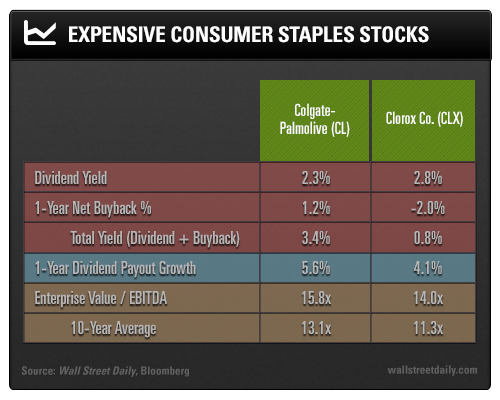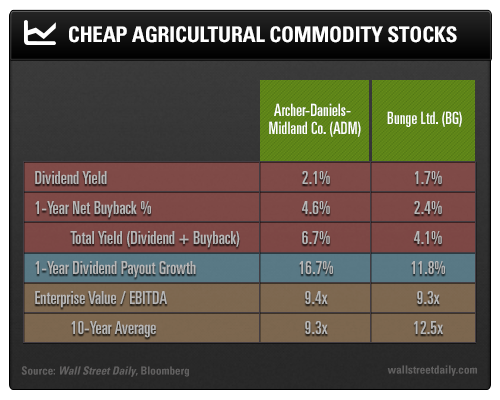I can virtually guarantee that you’ve used a product made by either Colgate-Palmolive (NYSE:CL) or Clorox (NYSE:CLX) in the past 24 hours.
These two companies produce some of the most popular household goods on the planet, including Irish Spring soap, Colgate toothpaste, Speed Stick deodorant, Palmolive dish detergent, Brita water filters, Glad garbage bags, Fresh Step kitty litter, and Tilex bathroom cleaner.
And given the ubiquity of their brands, it’s no surprise that investors feel comfortable owning the companies’ stocks. On top of that, Colgate-Palmolive and Clorox are both S&P 500 Dividend Aristocrats.
So what’s not to like about these consumer staples giants?
Plenty, as it turns out…

As you can see in the table above, CLX has a solid dividend yield of 2.8%. However, the company has increased its shares outstanding by 2% over the past 12 months, giving it a measly total yield (dividend yield plus one-year net buyback percentage) of 0.8%. CL’s total yield is also lackluster.
Making matters worse, the dividend payout growth rates for both of these Dividend Aristocrats are very low. The median S&P 500 one-year dividend growth rate is 10.4%.
Yet, perhaps the most unattractive qualities of these stocks are their valuations. As I explained last week, many dividend-paying stocks have become expensive due to their popularity. CL and CLX are perfect examples.
Clorox’s enterprise value-to-EBITDA ratio of 14.0x is higher than the S&P 500 median of 12.2x. I also like to compare current valuations to their historical averages. Clorox’s EV/EBITDA is 24% above its 10-year average of 11.3x.
Colgate-Palmolive’s EV/EBITDA is a dizzying 15.8x, which is 20% above its 10-year average.
Basically, these household products companies may have nice underlying businesses, but their paltry dividend growth and expensive valuations render them unappealing investment choices.
Now, let’s compare these metrics to those of two agricultural products companies.
Cheaper Agriculture Stocks
Archer-Daniels-Midland (NYSE:ADM) and Bunge (NYSE:BG) specialize in agribusiness and food ingredients. Basically, they transport, store, and process agricultural commodities, which are then sold to companies that produce the food we eat (or feed for the animals we eat). Both companies also have ethanol businesses.

At first glance, these stocks may seem underwhelming due to their average dividend yields. But upon further examination, there’s a lot to like.
Both ADM and BG have respectable total yields, since they’ve both decreased their shares outstanding through modest buybacks over the past year.
Furthermore, their dividend growth rates are higher than the median rate among S&P 500 companies. ADM also happens to be an S&P 500 Dividend Aristocrat. And despite narrow profit margins, both of these firms are generating plenty of free cash flow (operating cash flow minus capital expenditures) to cover those dividends.
Yet, the most alluring aspects of these stocks are their valuations.
Archer-Daniels-Midland’s EV/EBITDA ratio is 9.4x, which is a discount to the market and only a slight premium to its 10-year average. Bunge’s EV/EBITDA ratio is 25% below its 10-year average, offering compelling value with relatively low leverage.
The data in the first table goes to show that we shouldn’t blindly buy Dividend Aristocrats without doing any research. We also shouldn’t assume that consumer staples stocks will hold up well when the broader market declines. Many stocks traditionally considered to be defensive in nature have simply become too expensive to offer safety.
Conversely, both ADM and BG qualify as cheap dividend growers, which are exactly what we’re looking for as investors.
Safe (and high-yield) investing,
Alan Gula, CFA
